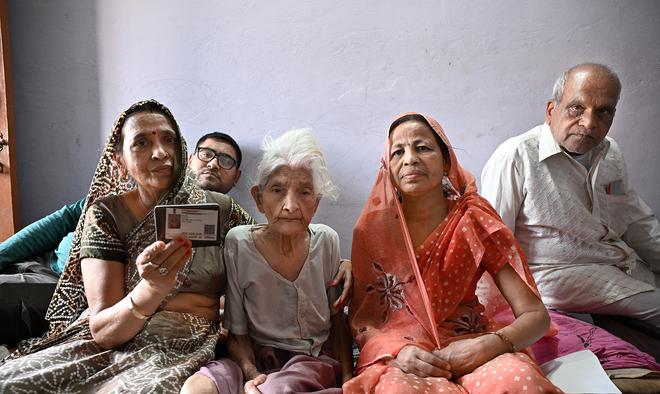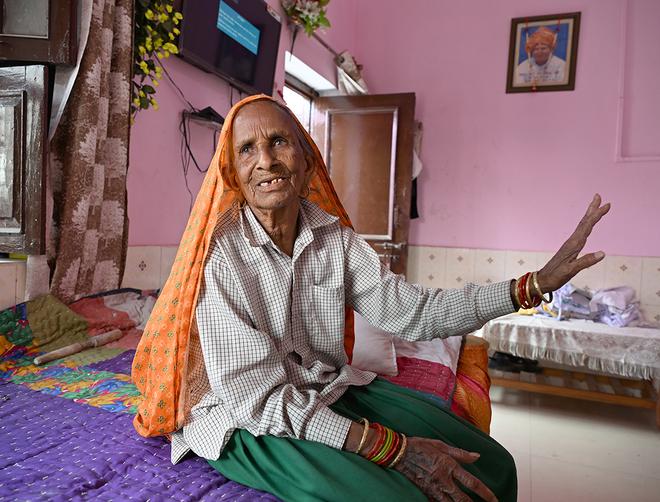Curled up under a multicoloured sheet on a folding bed, Kela Devi’s frail body goes easily unnoticed. It doesn’t help that the half-hearted light streaming in from the windows is blocked by thick, dark green curtains. Devi turned 101 on January 31 this year. Grimacing, she says, “Ab chala bhi nahi jaata. Khaat bhi paar nahi hoti (I can’t walk anymore. I can’t even cross over to another bed).”
A resident of Haryana’s Nuh, Devi says she has voted throughout her life, but doing so this year looks difficult. She’s not even sure how “safe” a voting method the postal ballot will be.
As India votes in the Lok Sabha election, which will be held in seven phases between April 19 and June 1, statistics from Haryana’s Chief Electoral Officer show that the State has nearly 11,000 voters over the age of 100, including 40 over the age of 120. Of these, 10,570 belong in the 100-109 age group, of which 60% (6,568) are women, while the remaining 4,002 are men. There are 337 voters aged between 110 and 119.
Of the 22 districts in the State, Gurugram tops the list with 1,115 centenarian voters in the 100-109 age bracket, followed by Karnal and Kurukshetra, with 865 and 632 voters in the same category, respectively. As per the Election Commission of India’s (EC) latest figures, there are 2,18,442 electors over the age of 100 across the country.
Looking back
Devi, who is originally from Kosi in Uttar Pradesh, says her health has been deteriorating after her grandson’s wedding in December last year. She now survives on a liquid diet, but despite her failing health, she says her memory still serves her well. She can easily call to mind the numerous significant political and social events she has lived through over the past several decades, right from the communal riots during Partition and the assassination of Mahatma Gandhi in 1948 to the demolition of the Babri Masjid in 1992.

“During Partition, I remember making chapatis on a chullah (earthen stove) when rioters attacked my village. We had to run for our lives. A Muslim neighbour saved us. It was only a year after my wedding that Gandhi was assassinated. I had even met him when he came to Kosi once,” Devi recalls with a touch of pride.
“I remember Subhas Chandra Bose, and even the day Sanjay Gandhi died in a plane crash in 1980,” she says, adding that she will never forget late Prime Minister Indira Gandhi’s 1971 election campaign slogan, ‘Garibi Hatao (Remove Poverty)’. She says she is also aware of who Prime Minister Narendra Modi and Congress leader Rahul Gandhi are.
Interrupting her, one of her three daughters-in-law, 62-year-old Urmila, slides in: “Sab yaad hai inko. Bahut yaad hai. Computer jaisa dimaag hai inka (She remembers everything. Her mind is like a computer).”
Devi attributes her mental agility to the times in which she grew up. “Everything was so pure then — the air, water, food. Even chapatis would give one so much energy. Now, even milk and ghee don’t have that power,” she says.
Mamta, the youngest daughter-in-law, chips in, saying her mother-in-law, though having lost her appetite, is still fond of anything spicy; gol gappas are her favourite. “A vendor comes to the chowk every day and she makes it a point to eat them at least twice a week,” she says, giggling.
The eldest of her sons, Naresh Jain, 75, runs a mobile repair shop on the ground floor of their house. He says his mother, who stays on the first floor, can no longer climb up and down the stairs. Getting her pension released is a struggle too. “I need to implore the bank manager every month to send someone to capture her biometrics and release the pension,” he says.
In the past, taking Devi to the polling station has been a task. “There are no wheelchairs or even regular chairs at the booths for the elderly to await their turn. Sometimes, the police offer their chairs, but it could be risky this time to take her to the booth,” says Jain.
Devi, though, remains completely informed about the country’s social and political upheavals. She says she has had a tough time raising her seven children, including four daughters, after the death of her husband, a tailor, in 1971.
Now, it is rising prices that worry her. “There has been a lot of development, but the rate of inflation is very high. Earlier, a few members could earn enough to feed everybody, but now, everyone has to chip in,” she says.
Still walking to booth
Huri, another centenarian from Nuh’s Ward No. 11, still climbs up to the terrace of her double-storey house every day, accompanied by her great-grandchildren, to shoo away monkeys. She even walks around her neighbourhood without any support to catch up with friends, although most of them are much younger.
“Do you know the secret of her health?” says her grandson Sewa Ram, 30, who is a chemistry teacher at a privately-run school. “A glass of milk every day and sweets,” he says.
While Huri’s son, Ramji Lal, who is in his early 70s, grapples with diabetes, she has no major ailment except cataract, which began to trouble her only a couple of months ago. “Maa hamaare ghar ki thanedar hai. Sab darte hai usse. Abhi bhi mujhe dant deti hai (My mother is the head of the family. We all are scared of her. She still scolds me),” says Lal, a contractor like his father, who died aged 87.

Married at 14, Huri, who is originally from Rajasthan’s Sikar, will turn 102 on May 14. She has never been to school, but has dutifully cast her vote in every election for decades.
A beneficiary of the monthly old-age pension scheme since it was introduced by late Deputy Prime Minister Chaudhary Devi Lal in the late 1980s, Huri remains a loyal supporter of the iconic farmer leader. “The polling booth is just a few hundred metres from our house. I can even walk up to it and come back without support,” she says proudly.
Confined to home
Manni, a resident of Kabeer Mohalla in Nuh’s Ward No. 8, has watched the last 10 decades of India’s journey unfold before her eyes. As per her Aadhaar card, she is 101 years old and was born on January 1, 1923.
“Tab, na road the, na phone the, na gaadi thi. Ab toh sab kuch hai (There were no roads, no telephones, and no vehicles in those days. Now we have everything),” says Manni as she slowly walks out of her room, walking stick in hand. She is clad in a lively orange ghagra (traditional skirt) and checked shirt.
As she tries to adjust herself on the cot in the living room of the house, Lakshman Das, the older of her two sons, says a surgery two years ago to remove a stone in her gall bladder has taken a toll on her health. “Before that, she could walk around without support, and would ride pillion on a motorcycle to get her pension and monthly ration. Now, she remains mostly confined to the house,” says Das, a vegetable vendor.
He says he is pleasantly surprised about the EC’s new rule allowing the elderly to vote from home. “I had not heard about it, but it is a welcome decision. We were a little worried about taking her to the booth this time. She cannot sit on the motorcycle anymore,” he says.
Das adds that as far as his experience goes, the booths usually have facilities for the elderly, including a wheelchair and drinking water.
Originally from Rajasthan’s Alwar, Manni says she has cast her vote in several elections. “Pehle mohar the, ab machine aa gayi hai (Earlier, we had to put a stamp, now there are electronic voting machines),” she says. “Earlier, I would vote after consulting with my husband, but after his death three decades ago, I discuss with my sons before casting my vote,” says Manni, insisting that she presses the button on her own. “My vote is my right and my voice,” she says.
Chance to vote from home
Senior citizens aged above 85, those with a disability, and people suffering from COVID-19 can opt for the postal ballot facility in the Lok Sabha election, as per the EC.
These three categories of voters must apply to the Returning Officer via Form 12-D during the period starting from the date of announcement of the election on March 16 to five days following the date of notification of the election, which will take place towards the end of April in the State.
“Booth Level Officers (BLOs) will visit those aged over 85 to give them the form, and will collect it soon after,” says Nishant Yadav, Deputy Commissioner of Gurugram.
“On polling day, a team comprising two officials, a micro-observer, a videographer, and security personnel will go to the elector’s address. They will carry along with them a voting compartment and get the elector to vote via postal ballot, maintaining complete secrecy of the vote,” says Yadav, adding that the process will be completed during the week before polling in Haryana, which will take place on May 25.
Anurag Agarwal, the State’s Chief Electoral Officer, says Deputy Commissioners have also been directed to identify the five oldest voters in their districts and felicitate them as a mark of respect.
Trained graduate teacher Dalbir Singh, who doubles as a supervisor for over two dozen BLOs in Gurugram’s Badshahpur, says a door-to-door survey is carried out every three months to cross-check the list of voters registered at each booth in order to weed out duplicate names as well as fake or dead voters. “Going by my experience, the number of centenarian voters could be, at the most, inflated by 10-15%,” he says.
A BLO, on condition of anonymity, says the actual number of voters above 100 years could be fewer than the official figures. He attributes it to two factors — the voters’ list not being routinely updated, and elderly voters falsely claiming to be of a higher age to avail themselves of age-related benefits. “With no documents to support the claims of age made by elderly citizens, their age in the official records is inflated. This is evident from the fact that in many cases, the date of birth recorded on Aadhaar cards is January 1,” he says.







